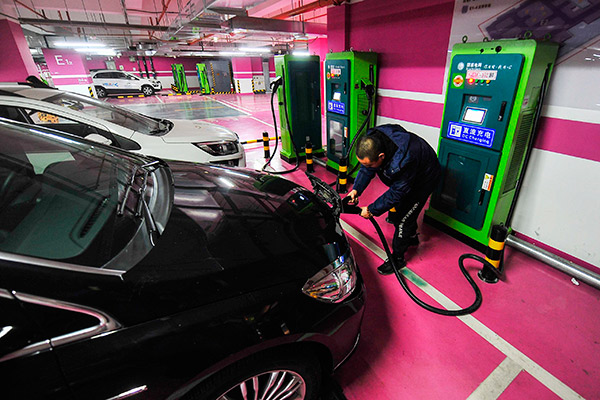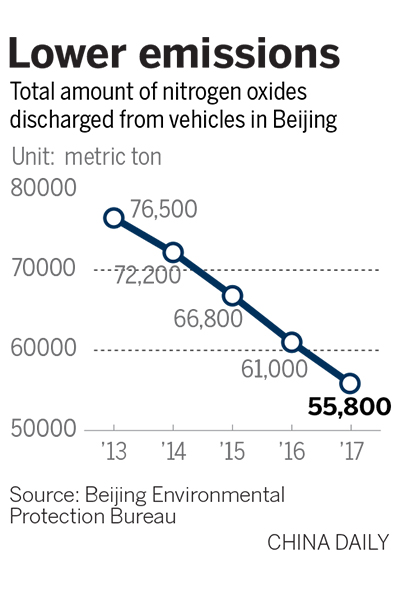
A driver charges an electric car at a parking lot at Beijing Tianqiao Performing Arts Center last month.[Photo/China Daily]
Beijing will boost funding for the war on smog by almost 600 million yuan ($93.9 million) this year, with one of the main targets the growing threat from vehicle exhaust, especially diesel trucks.
The city government has allocated 19 billion yuan to support comprehensive measures against air pollution, up by 590 million yuan year-on-year, according to information released over the weekend.
The extra resources will go toward controls on coal consumption, dust and industrial production, as well as technological improvements. Yet vehicle emissions will be a major focus, according to a report on Jan 24 by acting Mayor Chen Jining to the first session of the 15th Beijing People’s Congress.
Efforts to curb pollution over the past five years have led to improvements in Beijing’s overall air quality. The capital recorded 226 “blue sky” days in 2017, an increase of 28 days on the previous year, data from the Environmental Protection Bureau show.
Based on analysis from 2014, vehicle exhaust emissions account for 31 percent of PM2.5 — fine particulate matter that is hazardous to the health — in the air, said Li Kunsheng, the bureau’s director of vehicle management.
The biggest pollutants from vehicles are mainly nitrogen oxides, although exhausts can generate PM2.5 directly or indirectly after a photochemical reaction, he said.
Beijing has already phased out 2.1 million vehicles with large or excessive exhaust emissions, resulting in nitrogen oxides declining from 76,500 metric tons in 2013 to 55,800 tons in 2017, according Li’s data.
“But the threat from vehicle exhaust deserves more attention because it will contribute more to the air pollution in Beijing in the future,” he said, adding that emissions from coal consumption and industrial production have been cut significantly in recent years.
Li said many foreign cities including London have confronted similar problems in reducing vehicle pollution and some have adopted financial methods to cope, such as the congestion charges in downtown Paris and London.
The Chinese capital has not introduced congestion fees, but it does plan to step up controls in other ways, according to Chen, such as a citywide ban on “dirty” diesel cars and trucks.
Currently, vehicles that do not meet the city’s exhaust emissions standards — the highest in the country — are not allowed within the Sixth Ring Road. However, this will be expanded to cover all roads this year, he said.
The air pollution controls will not be easy to introduce, as they affect millions of families, “but they’re necessary to achieve better air quality,” Li added.

